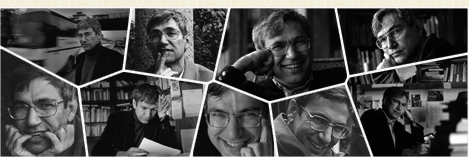COLD REALITIES
Like "a pistol-shot in the middle of a concert", politics are tackled head-on in this devastating parable
Review by Ángel Gurria-Quintana
SNOW
by Orhan Pamuk
translated by Maureen Freely
Faber 436 pages
An urgent question seethes at the heart of Orhan Pamuk's latest novel: "Can the West endure any democracy achieved by enemies who in no way resemble them?" Judging by the Turkish author's devastating parable of political extremism, the answer is no.
Snow is Pamuk's seventh novel, and the fifth to be translated into English. Its narrator is Orhan, familiar to readers of Pamuk's The Black Book. Orhan tells the story of his friend Ka, a poet returning to Turkey after 12 years of exile in Germany. For reasons both professional and personal. Ka travels to the remote town of Kars near Turkey's eastern border. He arrives on the eve of mayoral elections, sent by an Istanbul newspaper to investigate an "epidemic" of young women's suicides. Secretly. Ka is also hoping to find Ipek, a woman he knew in his youth and whose beauty he has cherished ever since.
When heavy Snowfall cuts off all routes to Kars, isolating the town for three days. Ka feels "as if he were in a place that the whole world had forgotten". As he goes about his journalistic business in this confined microcosm, he uncovers a hotbed of intolerance and radical politics fuelled on all sides by fear.
He can draw no easy conclusions within a culture in which women kill themselves in defence of their religion, but are slimmed by their relatives for committing sinful suicide. Although Ka is at ease among the town's secular elite, he discovers that his host's daughter - Ipek's sister - is leading a group of girls demanding the right to wear headscarves. Ipek's ex-husband, once a westernised poet who has since embraced political Islam, is the candidate most likely to succeed in the impending election.
Nor are Ka's beliefs as unshakeable as he thinks: a declared atheist, he soon meets and sympathises with "the infamous Islamist terrorist" Blue. And yet he worries like many others "that the Westernised world he had known as a child in Istanbul was coming to an end". The spectre of Iran's ayatollahs looms large over the secularists' nightmare.
"What's more important, a decree from Ankara or a decree from God?" asks a zealous Islamist. While Ka merely ponders the question, other characters are prepared to act on what they assume is the correct answer. Faced by the prospect of an Islamist victory at the polls, a theatrical troupe devoted to the modernising mission of Atatürk, founder of the Turkish Republic, takes advantage of Kars' isolation to stage a deadly coup, brazenly exposing the limits of the democratic principle that modernisers claim to embrace.
In the discord that follows Pamuk heeds all sides. Atheists are chided for relying on the army. Islamists are reminded that they can pray-to their heart's content only because "godless" modernisers are running the country. A radical secularist expresses scorn for moderates like Ka. expecting democracy and human rights while “buttering up" Islamic fundamentalists. A self-proclaimed ''communist, modernising, secular, democratic patriot" joins forces with Islamists and Nationalist Kurds to protest against the coup, but is soon persuaded that "the army is right to want to keep them out of politics. They're the dregs of society, the most wretched, muddled, brainless people in the city." Caught in the thick of events, Ka's only wish is to flee with Ipek.
Upon meeting the narrator after the tale's tragic denouement, an acquaintance of Ka pleads: "If you write a book set in Kars and put me in it, I'd like to tell your readers not to believe anything you say about me... No one could understand us from so far away." This is the type of playfully self-referential twist that has garnered Pamuk well-deserved comparisons to Borges, Calvino and Kafka. One might add Auster, Saramago and Sebald to the list.
As in The White Castle and My Name is Red. Pamuk elegantly dissects the recurrent quandary in Turkish history - look westwards, or inwards and backwards. If Snow is less subtle than its predecessors, if it is often didactic and occasionally strident, it is only because its subject matter is more immediate.
Never one to flinch from the weighty issues of Turkey's past and present. Pamuk is here at, his most political yet.
And, as one of the book's epigraphs reminds us, "politics in a literary work are a pistol-shot m the middle of a concert... We are about to speak of very ugly matters."

